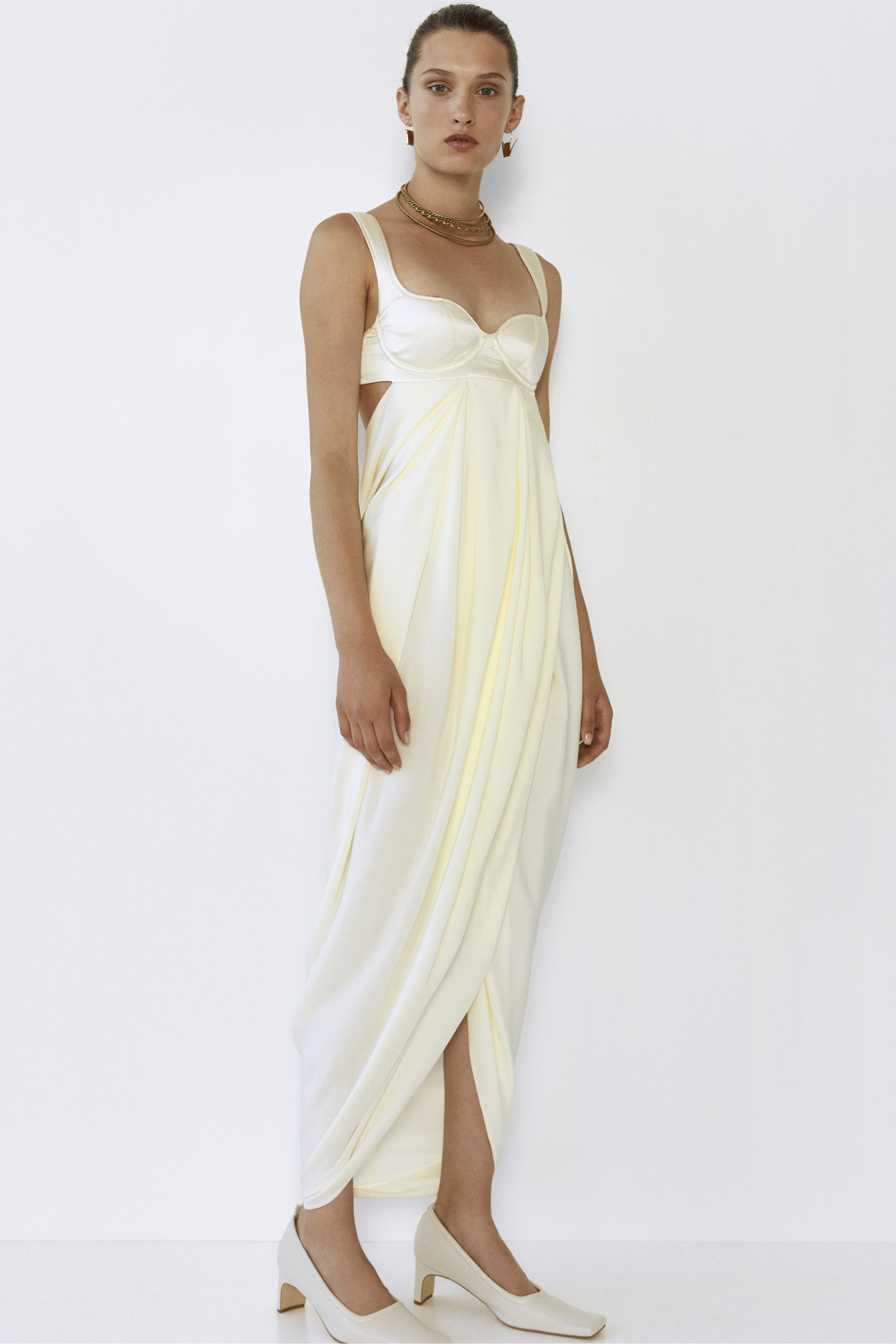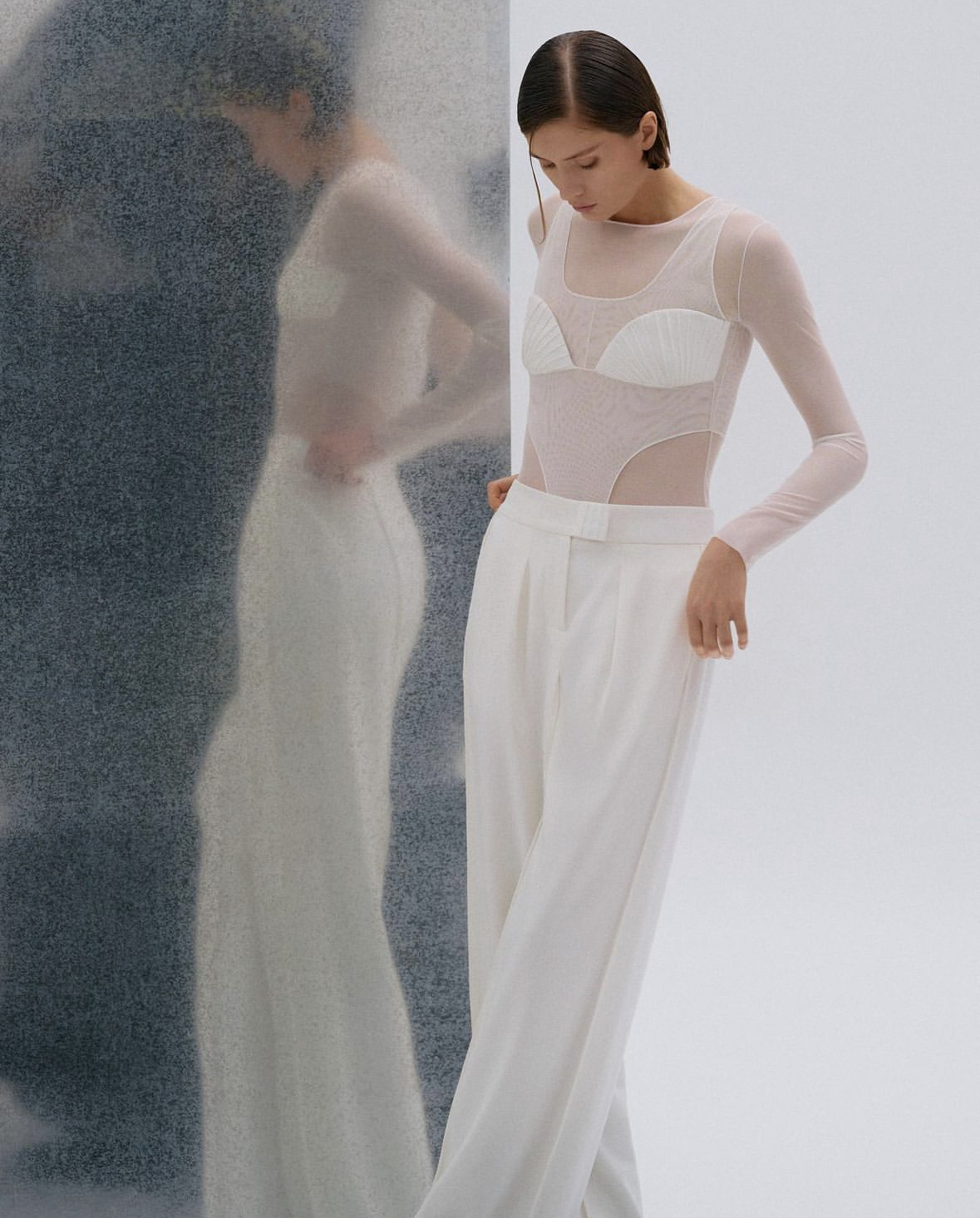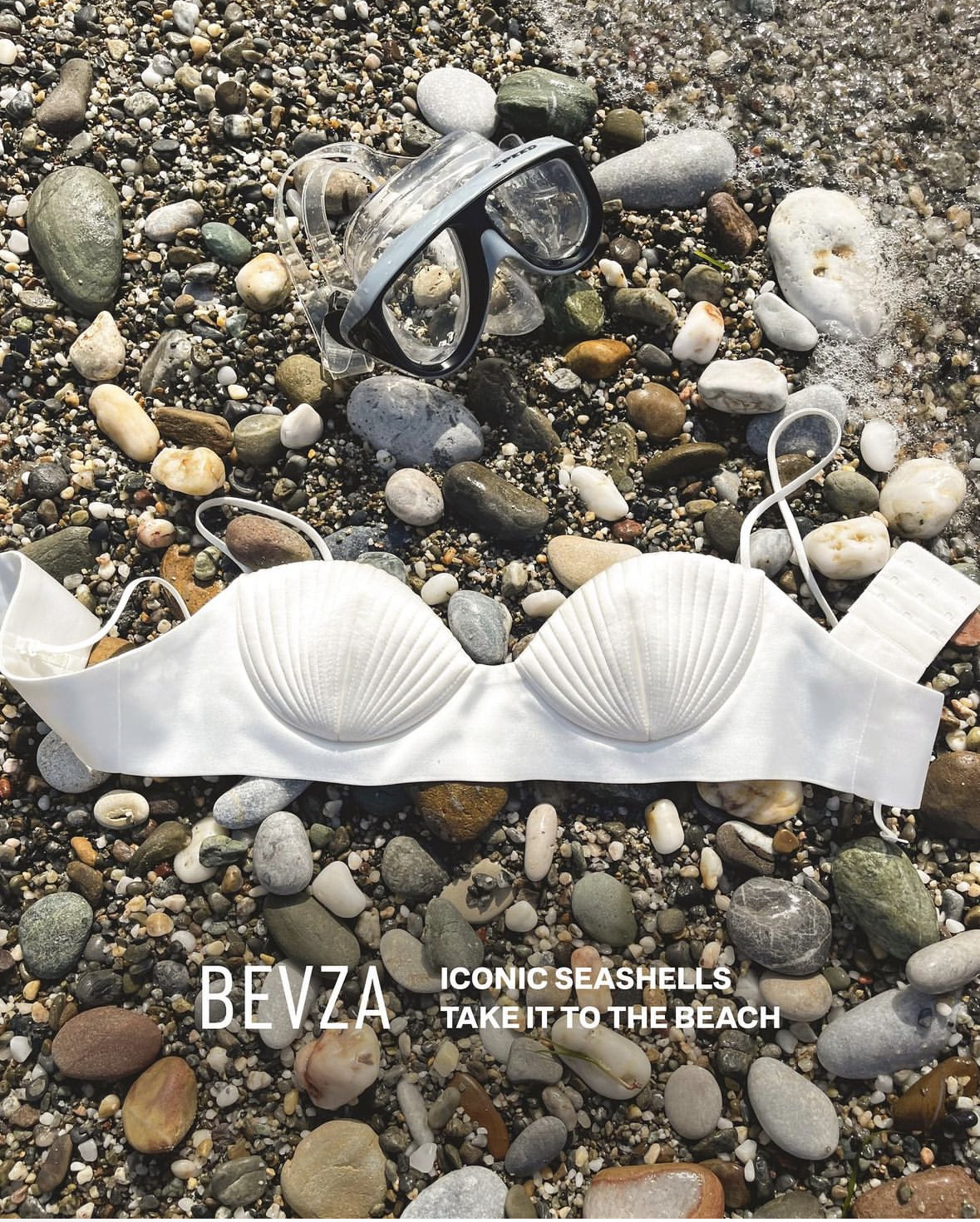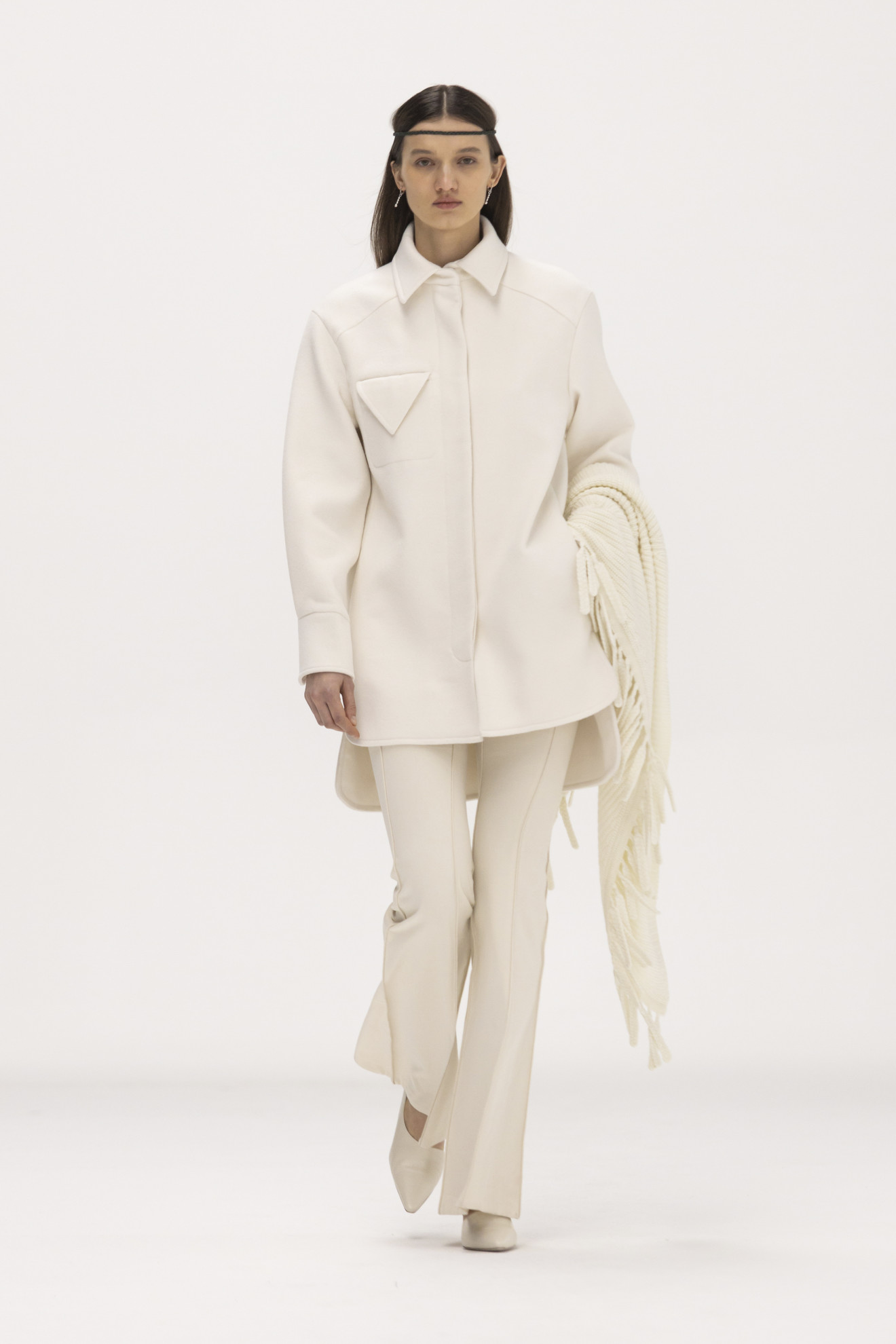Svitlana Bevza on Building her Brand through Inner Resilience and Outer Resistance
By Angela Baidoo
There is an ongoing battle being fought in the industry, as independent designers struggle to stay afloat against a rising tide of high inflation, an increasingly skittish consumer base, wholesale channels closing down, and weighing up the cost of doing business with diminishing returns. But imagine having to run an independent fashion brand navigating the realities of an actual battlefield raging in your home country. Would it break you as a brand or help you to build a sense of resilience and resistance?
Enter Bevza, a Ukrainian luxury ready-to-wear brand founded in 2006 by creative director Svitlana Bevza, which prides itself on being ‘Made in Ukraine’. And following two years since the Russian invasion of her home country, Bevza the designer, has exhibited a rare level of defiance and bravery in her determination to persevere.
Bevza has become the in-the-know ready-to-wear brand for clean minimalism made modern. Communicating a need for collections with long-term appeal while never forgoing a specific design language which draws on the designers heritage and unique cultural perspective. Leading to one of the few brands in the market that can still be referenced as authentic, without it being perceived as disingenuous.
Known for working with a palette in-and-around a spectrum of white hues – if you were to take the first look of each of her collections you will note that Bevza always starts each season with white – there is a strong belief in the clean energy of the colour, but far from making her designs simplistic, there is the considered application of texture, from masterful pleats and folds which replicate the design of a wheat shaft or spikelet (wheat is symbolic in Ukrainian culture for its links to the past and as a sign of fertility) to seashell shaped quilting.
Here, The Impression talks to the self-taught designer who originally studied for a degree in Economics, on how to build resiliency in the face of adversity, her advice for independent brands, and how she has embedded her heritage into her design narrative to create a strong brand identity.

How to Build an Authentic Brand
Angela Baidoo: Can you share the Bevza brand journey, from building it from the ground up in 2006, to where you are now? As well why it is important to you to put Ukraine on the map as a creative hub?
Svitlana Bevza: Bevza is one of the pioneers of Ukrainian fashion, it was a group of enthusiasts who wanted to build something, and even though we started as a small local atelier in 2006, it really started well before then when I was 5, I showed my mother some sketches and I told her I wanted a fashion house, but she thought that a fashion house is a literal building where women get dressed. This was my true passion (Bevza originally studied Economics at university) and even though the local atelier went well, I really understood the need for exposure after I took part in the Vogue Talents contest which was started by Sarah Maino – the competition was founded by Maino in 2009 as an online and editorial project which scouted and supported emerging creative talents. Scouts found me in 2012 and I reached the final of the contest which was established before the likes of the LVMH prize, and this made me understand what exposure could do for a brand.
It gave me a completely different kind of exposure to the industry, as after that we went to wholesale showrooms abroad which is how our dialogue started with the world. Then the big push for us came with New York fashion week, and after that we started to grow very quickly.






Svitlana Bevza: In 2006 we were a very small team, but I had pattern-making experience, and I knew how to sew and knit by hand, because in Ukraine we were taught this by our grandmothers. There was no basis of (fashion) education at the time, so I’m a self-taught designer and this has shaped my style in a different way. If I would have had the opportunity to go to Central Saint Martins in the late nineties I would have done that, but Ukraine in the nineties was a different world. I studied economics at university instead, so my degree is in that subject, but then when I started going to pattern-making courses in Ukraine and practicing, it became what you see in Bevza today – my intuition plus years of practice, and of course the vision.
Cultivating Craft and Creativity in the Face of Adversity
Angela Baidoo: So, you started and are still operating the atelier in Ukraine?
Svitlana Bevza: Yes, everything was started in Ukraine, and we still operate from there, the pattern-makers, the atelier, and the main team, are all in the country.
Angela Baidoo: But, you are currently based in London? What made you decide to make the move, especially considering the fact that the atelier is still in Ukraine?
Svitlana Bevza: I recently moved here (London) for my children’s education, and I love it here, but when we first started moving around Europe we first spent some time in the Czech Republic. Then we went to Portugal to source some factories, as this was to be our contingency plan if we were ever unable to proceed with production in Ukraine, it was also to be an option if we needed to relocate the team. But as it happened we were able to reopen our production facilities (following the invasion of Ukraine in February 2022), and this was the most important thing to me, to be able to produce in my home country and save the team who I have been cultivating for years, as those are people who are really close to me.

New creative hubs are emerging every season, as fashion looks outside of the big four for inspiration. We are finding that new designers are being discovered in cities as diverse as Dakar and Dubai, as each hub develops their own eco-system to cater to the local market and create fashion weeks which are becoming ground zero for cultivating the next generation of talent who might push the industry forward. For Svitlana Bevza the importance of embedding her heritage in her work was always something she worked towards in her collections, but since the outbreak of the war in Ukraine it has become more important than ever for her to amplify her heritage in her work, to let the world-at-large know that creativity can still be nurtured amongst chaos.
It’s natural for me, as I am not a French or English-born designer, I’m a Ukrainian designer, but it is not only now that I am putting emphasis on my heritage, it was something which I did before the war, but as the country has been so heavily muted (by Russia) we are now paying too high a price for being recognised. But, as Ukrainians we still want to say that we are here.”
– Svitlana Bevza, Creative Director, Bevza
Through her brand, Svitlana Bevza, is seeking to promote Ukraine – outside of what is being shared in the news on a daily basis – because for her it is an intrinsic part of her identity. And as is often the case with world events of late, being absorbed, debated, and dissected by both traditional and social media, the public often tend to move on and become desensitised to atrocities.
This is something that Svitlana Bevza cannot do as she continues to communicate with family and friends who still reside in Ukraine. The promotion of her heritage via her work as a fashion designer is her way of contributing, on this she said “I am not trying to convince anyone that Ukrainians have to be placed higher than anyone else, but I want to protect our national identity, because we have a separate identity. We are separate countries and have always been, for example Kyiv existed centuries before Moscow, but over generations propaganda has muted that fact. Part of my family, and my husband is still in Ukraine so now is the time to promote Ukraine, but in a very elegant way, and we can do that because we (Bevza) are not the producers of national costume, I’m a fashion designer and we are a ready-to-wear label. We have many categories and are currently working on the handbag line, and the core detail there is the spikelet, which is a part of our DNA as Ukrainians.”
Sharing Symbolism and Connecting Via Culture
Angela Baidoo: Speaking of the Spikelet, was the jewellery category a natural progression for you? And what was your thinking around embedding such a strong symbol from Ukrainian heritage in the designs?
Svitlana Bevza: It wasn’t something that I chose, I believe the people chose it. I remember the inspiration for the very first spikelet piece came when I was thinking about doing my first set of earrings. We had a photo shoot in a field of poppies in Ukraine, and poppies usually grow in wheat fields. At the time there was a car crash in the road next to the field and a woman was thrown from her car into the wheat field. We ran towards her but she only had a few scratches, because the softness of the wheat broke her fall. I clearly remember pulling some of the stalks from her and as it happened I kept one spikelet in my hand. When I returned to the office I was still in a state of shock at what I had witnessed, but I was still thinking of how that spikelet saved that woman. And that’s how it began for me. But, also why I say the audience chose that symbol is because there was no intention to create the jewellery line as a separate category within the brand, but we just received so many requests. And this is something which is precious to me – when a product speaks for itself.

Angela Baidoo: Can we discuss a bit about the meaning of the spikelet and its symbolism in Ukrainian culture? And why it has resonated with your customer in the way it has?
Svitlana Bevza: Yes, well the spikelet is the main symbol of Ukraine, as we are one of the largest exporters of wheat in the world. We still feed a lot of countries. And for centuries we have been trying to defend our land from our neighbours. We faced artificially created hunger in the 1930s (the Holodomor was a man-made famine engineered by the Soviet government in 1932 and 1933),and this is something which we still remember, so in all Ukrainian traditions bread is a sacred symbol. When you get married or for any special occasion, we bring bread. And I found this to be a wonderfully visual way to represent an important part of Ukrainian identity.
When the war started, the millions of women who were abroad needed this symbol as an identifier to connect them with Ukraine, and that’s how the jewellery line grew.
Bevza’s jewellery line, which displays some of the brands most overt identifiers of Ukrainian cultural heritage in the spikelet, also fearlessly evolves to represent the atrocities being inflicted on the country. In 2022 when attacks by Russia led to the widespread devastation of wheat fields through fire – leading to a food crisis that had ripple effects across the globe – Bevza created a blackened ‘Spikelet of Wheat’ necklace as a way to, according to the brand “commemorate these tragic events, honouring the memory of Ukrainian scorched fields and the enduring spirit of our country” utilising the tool of ‘elegance’ which Svitlana Bevza recognises is the best way for her brand to keep the conversation at the forefront.


Angela Baidoo: For your Ukrainian customer, is it important for you to include elements that they will recognise within the design of your clothes which link back to their heritage?
Svitlana Bevza: Its easy for me to implement those ideas, because I grew up with those symbols and its my heritage, but what I create is a modern heritage for all people. Around the world Bevza can be me, you, your friends, and hopefully with all the symbolism it can be for your daughter, your granddaughter. But, my style preferences have always been – to reference a cliché -“Quiet Luxury”, because I feel much more sexy when I am more covered.

Resiliency Through Resistance
Angela Baidoo: How have you managed to build your resiliency as a brand, especially taking into account the current volatility of the industry?
Svitlana Bevza: Well, Ukrainians are such hard workers and for me and my team we made the decision to never sit and wait for something (or for things to shift in the industry), we just do. We pledged to go on, to do our jobs, and this I believe helps to keep people in a better emotional state. And all the success which comes has been our success and we are very proud of it.
In the last four years since the pandemic, the closure of well-loved independent brands has been a subject which hasn’t left fashions discourse. As both well-established and new names have faltered as tough economic conditions, a lack of financial support, and a hesitant consumer have proved obstacles to difficult to overcome. On this subject Bevza concedes that to survive independent brands need to double down on what sets them apart in a landscape where one $750 drop-waist dress is competing with a dozen other imitators in the market. Getting clear on your value proposition and communicating that with your customer in an honest and open dialogue is a formula which has driven her brand since its launch.
The formula which worked for us was partly me still shaping collections by myself. Take my previous collection for fall 2024, many people said that it was all about the styling, but basically there was no styling, it was simply how would I wear each item for the everyday. So, it was a very sincere dialogue with the customer. And I style the lookbooks and the shows to create a holistic picture of my vision, so I can give it to my daughter, and she will understand the collection.”
– Svitlana Bevza, Creative Director, Bevza
Svitlana Bevza: For all the independent labels, the advice I would give is that they should crystallise their DNA and distil their brand. I think it’s vital and this has been my formula for success. I believe that independent labels, or any brand with a product that is different from another product will have longevity, because there is too much choice in the world. Of course I think do we need another pair of trousers, and I acknowledge that if I produce just to produce I would be bored and I would quit the industry, but by telling the story (of my heritage) and adding a sense of symbolism, this is what continues to drives me. Take our seashell dresses as an example, which is a style we launched years ago and is still very popular, the message behind them was the fact that women are like pearls, they are precious.




Angela Baidoo: And to that point, what do you feel are some key things brands should be communicating at this time? Should they be talking about longevity, for example?
Svitlana Bevza: Absolutely, this is something we are doing already. We source fabric from dead stock, for example we regularly use Nona Source, and we also incorporate zero-waste production. Our recent flat caps from our last collection for spring 2024 (which were inspired by London) are made from leftovers, we used what we had in our atelier. There is also the square bra top in our collection which is made using zero-waste production methods.
We are also trying to maintain our connection to the artisan work done by Ukrainians, as they are very good at sewing, knitting, beading and creating items that are unique as they are done by hand.


Svitlana Bevza: We have always considered sustainability, as for a long time we used recycled plastics (ocean-derived yarns made from plastic). I also believe that it’s even more vital for independent brands to push through the idea of sustainability, because its easier to do on a smaller scale, in terms of the production of smaller quantities. And (for us) this movement has been consolidated as we have been doing this with Bevza for a long time.

Supporting the Next Generation of Ukrainian Designers
Angela Baidoo: Following your partnership and co-hosting of the ‘I Am U Are’ creative fair last November, do you have any initiatives that you wish to collaborate with next? Or would you like to be a judge on one of the industries design prizes?
Svitlana Bevza: I have been invited to be a judge multiple times in Ukraine, but now I am working with a Ukrainian foundation based in the US who asked me to take part. They want to offer scholarships to talented creatives from Ukraine, which will allow them to enter universities abroad and give them a chance (to break into the fashion industry). And I am on the jury for the art category of the prize which for me is very inspiring. Also within the idea of shaping and encouraging the next generation, I chose this prize as I believe a different environment will influence the winners style. Psychologically their personalities will be shaped differently, than if they were being taught in Ukraine. I know there are so many bright talents in my country – from artists to designers – and I would say to the next generation it will not be easy, but you must find your core as it is what will help you maintain your passion.
Angela Baidoo: And, are there any designers or categories you’re eager to work with in the future, even if its something you haven’t had a chance to yet?
Svitlana Bevza: I would love to work in furniture and collaborations in general, I feel I am really open to a lot of things, but yes furniture is very appealing to me.
Angela Baidoo: What has surprised you the most about starting or running your brand?

Svitlana Bevza: A very pleasant surprise was when Demna of Balenciaga invited me to the Met Gala, this was huge for me. We talked at the time and he said he wanted a person from Ukraine to attend, but someone who also represents the US market and has a strong identity behind their brand. So, I was very grateful for that opportunity.
Angela Baidoo: And, how was it attending the Met Gala, what was that experience like?
Svitlana Bevza: I was very nervous at the beginning, but then it was a great chance to showcase my brand, as all the Ukrainians who watched it understood the symbolism of what I wore, which was a capelet with wings of hope and the spikelets were represented too, it raised the spirits of Ukrainians. It was a great chance to represent my country, and it was the first time in history that we (Ukraine) had been there. My plus-one was also Ukrainian model Pasha Harulia, and I chose her as she is from Crimea which is part of Ukraine (it is internationally recognised as part of Ukraine, but has been under Russian occupation since 2014) and she chose a Bevza dress with seashells, as the emblem of Crimea is the seashell. So the symbolism was everywhere, because why else would we go to the Met Gala.
The Bevza Creative Process
Angela Baidoo: Where do you start with your creative process each season? Especially as you work towards preserving the Ukrainian craft techniques of local artisans?

Svitlana Bevza: It’s actually quite funny, as sometimes my team doesn’t know what the final collection will look like until the end, but the thing which I have learnt over the years is that you don’t need to search for artificial inspiration. Live your life and observe everything, think of a message and try to shape it visually. For example, the marigolds (featured as a print in the spring 2024 collection) came from my memories of my grandfather who gave me one, and I planted it on my balcony, and in the autumn, I took the seeds and replanted them. So within my brand I thought how do I revive the marigold? It was also a huge risk as it’s not a minimalist flower, it has so many petals and the colour is so vibrant but I was intrigued to work with it, and I was also texting my team and telling them I need the literal flower as a piece of jewellery, but also I want it as a print and they said “You a print? But how?” so I love the process.
The process can be complicated as well, as we are trying to keep everything in Ukraine. I recently had a call with my team and we are having to consider a relocation for the winter because there could be problems with the lights (electricity), but they said “No way”, and I don’t know if that’s a good thing or not. They have resilience and they don’t want to go as many still have family in the country. They have persevered for the last two years so why leave now?
So now, of course it’s a very different process in terms of our production. So everything you see with Bevza is ‘Made in Ukraine’ and I accept it in a very pragmatic way as we live in this reality, but I think its cool to explain what is happening everyday behind the making of the product.




Angela Baidoo: Within your designs, if you look at all the collections as a group you see that white is very prominent, what is the significance of white and the ‘White Dress Concept’ in your collections? Can you speak a little about that and why white is so symbolic for you?
Svitlana Bevza: White is a colour of pure energy, it’s a very positive colour. Its like when you start from wherever you are now, you are able to start the new day with a blank sheet of paper, and then colour it in. There is the idea of inner resilience, as white is also the colour of hope and is associated with something very clean. I will admit it’s a very complicated colour to work with so I’m always very intrigued by it, but starting from the first collection white has always dominated. Yes, it always dominates
Angela Baidoo: And who would you say is the Bevza woman?
Svitlana Bevza: The thing is whether it’s you or me, the girl you see on the street or Instagram, the most important thing is not the age of the audience but what is in their heads. It’s the messaging, so the Bevza woman is someone who shares our values and that’s how the natural audience has grown, and also stayed with us. Its also important to mention the Bevza woman is about elegance, and by elegance we mean not only the way you dress, but the way in which you communicate with the world, your parents, friends, the environment.
